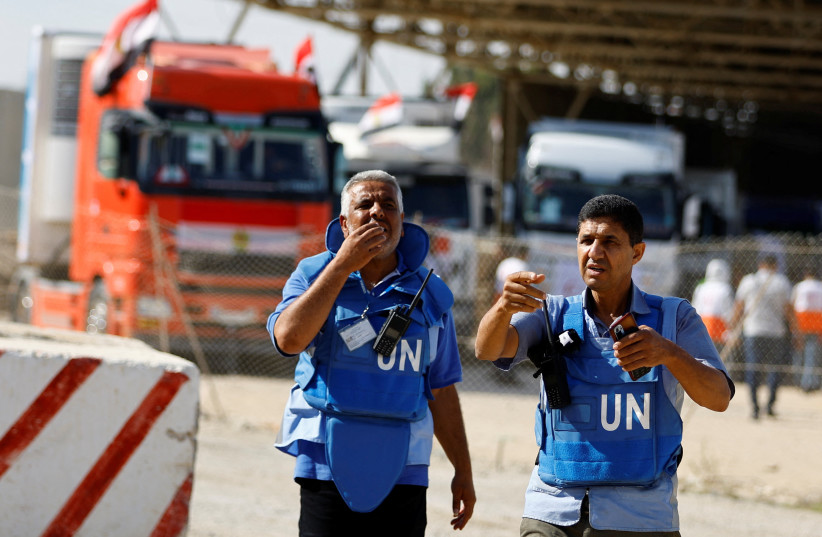Israel is monitoring the humanitarian situation in Gaza as the IDF pushes back against claims that Gaza has various shortages.
In contrast to Hamas, which exploits civilian suffering, the Coordinator of Government Activities in the Territories (COGAT) stressed on Sunday that Israel is “trying to act in accordance with international law to minimize harm to civilians.” COGAT implements the government’s civilian policy in the West Bank and towards the Gaza Strip.
In a briefing Sunday, Elad Goren, an officer in COGAT, provided an overview of its activities. He noted that on October 7, Hamas terrorists attacked the Erez crossing where the Defense Ministry unit has officers. The crossing was previously used by Gazans who had permits to enter Israel and also to enable Gazans to leave the coastal region for medical treatment in Israel. Three COGAT soldiers were murdered on October 7. The IDF noted that before the attack, thousands of Gazans had used this transit point for medical treatment.

Israel stresses that Hamas uses “civilians as a means to an end.” The genocidal terrorist group also wants to present the humanitarian situation as worse than it is. Hamas also uses civilian facilities to shield themselves. In addition, it is important to note that the Health Ministry in Gaza is run by Hamas. “When the Health Ministry makes a report, it is not neutral, rather it is a Hamas-run ministry in close contact with [Hamas’s] military wing.”
The IDF is aware of reports of humanitarian distress in Gaza. COGAT “assembled a team of experts that assess the humanitarian situation on a daily basis – what is in stock and what is missing – and we interface with international organizations in Gaza. Even now in the next room, I have my officers with UN agencies that update our assessment accordingly.”
The IDF monitors the full scope of water, food, energy, and health needs. “We check what is the situation in UN warehouses and shelters, the amount in hospitals and food warehouses, and the condition of water supply wells and desalination facilities,” the IDF said.
Israel asserts that there is no food shortage in Gaza and there won’t be for weeks to come. COGAT also stressed that “90% of drinking water is self-sourced [from Gaza] and 10% comes from three waterlines from Israel.” Hamas struck one of those lines on October 7; Israel has now opened two of them, which supply 28.5 million liters of water a day. The IDF pointed out that Hamas “damaged the water infrastructure and we have to repair it... there is water supply in Gaza; it answers humanitarian needs.”
COGAT also said there is medical equipment available in Gaza. “It is managed by Hamas and they manage what to keep and when to supply to hospitals. When medical equipment goes to the Hamas-run Health Ministry, they decide where it goes.”
In addition, the energy situation in Gaza was also harmed by Hamas on October 7 when they destroyed nine of the 10 power lines that go from Israel into the coastal region under their control. COGAT noted, however, that most of the essential facilities in Gaza, such as sewage treatment plants and hospitals, have generators and solar power, and can operate on locally stockpiled fuel. Solar energy accounts for 70% of the energy needs of one hospital, for instance.
“Hamas, which governs the Gaza Strip, manages the diesel supplies; hospital administrators in Gaza have been shouting since the beginning of the war that they have diesel fuel for only another 24 hours but they are still operating. Hamas is supplying them the fuel and has an interest in keeping them operational, because hospitals above the ground became Hamas centers underground,” the IDF noted.
On Friday and Saturday, the IDF revealed how Hamas uses Shifa Hospital in Gaza as a command center.
“Hamas only cares about themselves and doesn’t care about residents of the Gaza Strip... yet we still do what we can to protect residents; we are not in a fight against the civilians of Gaza,” COGAT said. Israel has said that Hamas puts civilians in harm’s way and uses people as human shields.
Plans to dramatically increase aid to Gaza
Before the war, Israel permitted 18,000 Palestinians from Gaza to have work permits; they received average monthly wages of NIS 7,000. This helped the poverty-stricken region, where unemployment was in double digits.
In addition, 2.2 million tons of food entered Gaza via the Kerem Shalom crossing in 2022. Gaza’s economy improved in the year before the Hamas attack of October 7. Israel has heeded the US request to facilitate humanitarian aid to Gaza; it does this via Rafah crossing in Egypt. The aid is checked at Nitzana in Israel for security reasons and then goes on via Egypt with a US and UN role. Food, medical, and other supplies are entering Gaza.
“In the coming week, we plan to increase dramatically the amount of assistance,” COGAT said Sunday in the briefing. This will go to Khan Yunis and an area Israel has marked for civilians who fled to southern Gaza.
“Hamas opened a war against Israel and the [Hamas] government hurts and exploits those who are not trying to take part in terrorist [activities],” the Defense Ministry unit said. “We will not allow the Hamas regime to exist the day after. This is a war; COGAT will continue to track the humanitarian operation, but Israel and the IDF will continue to fight against terrorism to bring back our kidnapped people and provide security.”
The coordinator also said they will work to minimize the harm to the civilian population and try to avoid a humanitarian crisis.
